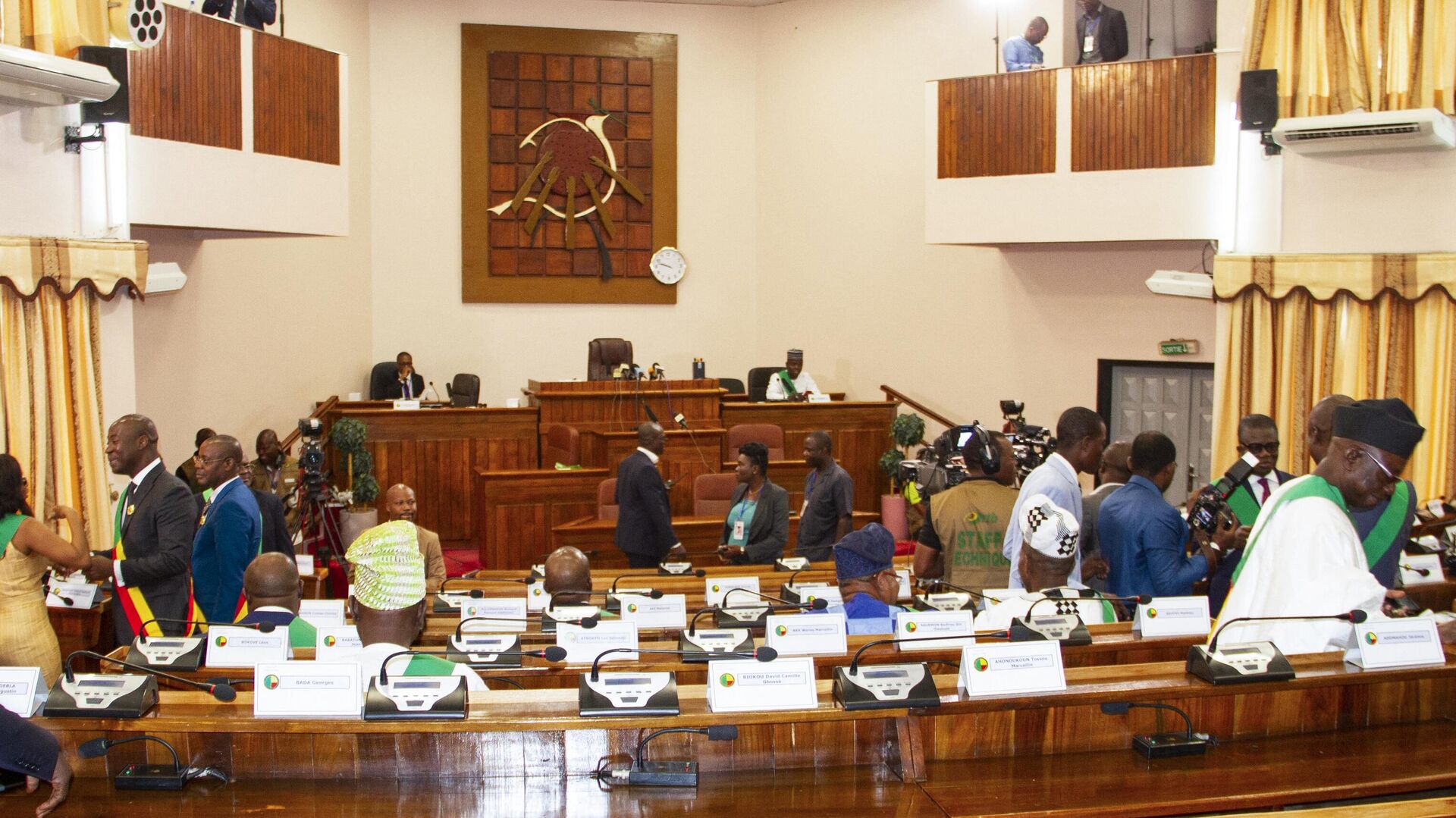https://sputnikglobe.com/20230106/benins-opposition-to-participate-in-upcoming-legislative-elections-on-sunday-1106087002.html
Benin's Opposition to Participate in Upcoming Legislative Elections on Sunday
Benin's Opposition to Participate in Upcoming Legislative Elections on Sunday
Sputnik International
This week Benin is getting ready to hold legislative elections scheduled on Sunday with several opposition parties taking part in the electoral race.
2023-01-06T15:22+0000
2023-01-06T15:22+0000
2024-06-30T14:29+0000
africa
west africa
benin
elections
parliament
political crisis
parliamentary elections
https://cdn1.img.sputnikglobe.com/img/07e7/01/06/1106085661_0:165:3053:1882_1920x0_80_0_0_eea1312cbc4fd8169b5f593bcc3f76be.jpg
Benin is getting ready to hold legislative elections scheduled for Sunday, with several opposition parties taking part in the electoral race.Seven political parties, among which three are in opposition, are vying for 109 seats in the country’s legislative body, the National Assembly. The election campaign runs from December 23 to January 6. Members of the National Assembly, whose number has been raised from 83 since the last elections, are elected by proportional representation in 24 multi-member constituencies to five-year terms, with a limit of three terms. The parties vying for seats in the National Assembly include:The Democrats, an opposition party, was initially barred from running in the upcoming elections. However, in November, the Beninese Constitutional Court ordered the Electoral Commission to accept a reshuffled list of candidates from the party. The first two parties in the list were the only political blocs participating in the last elections, which were held in April 2019 and resulted in the Progressive Union winning a majority of seats - 47 out of 83, and the Republican Bloc coming in second. Both parties support the country's incumbent President Patrice Talon. In previous elections, the voter turnout had not fallen below 50%, while in 2019, just 23% of voters cast ballots. In July 2018, a new electoral code was introduced in the country that aimed at reducing the large number of active political parties by putting more strict conditions for entering parliament, including the creation of an electoral threshold of 10% of the national vote. The deposit required for a parliamentary list was also increased from 8.3 million to 249 million francs. The reforms forced the country's parties to merge and form blocs prior to the 2019 elections. Even though it was reported that the opposition would create a single bloc, only two blocs linked with the president were registered to contest.
africa
west africa
benin
Sputnik International
feedback@sputniknews.com
+74956456601
MIA „Rossiya Segodnya“
2023
News
en_EN
Sputnik International
feedback@sputniknews.com
+74956456601
MIA „Rossiya Segodnya“
Sputnik International
feedback@sputniknews.com
+74956456601
MIA „Rossiya Segodnya“
benin, west africa, legislative elections, opposition parties, beninese parliamentary election
benin, west africa, legislative elections, opposition parties, beninese parliamentary election
Benin's Opposition to Participate in Upcoming Legislative Elections on Sunday
15:22 GMT 06.01.2023 (Updated: 14:29 GMT 30.06.2024) Internal political and social tensions are recurrent during electoral periods in Benin. In 2019, a political crisis accompanied by nationwide protests followed the country's parliamentary elections, which were held with no opposition candidate and resulted in all 83 seats in the legislative body being taken by two parties allied with the president.
Benin is getting ready to hold legislative elections scheduled for Sunday, with several opposition parties taking part in the electoral race.
Seven political parties, among which three are in opposition, are vying for 109 seats in the country’s legislative body, the National Assembly. The election campaign runs from December 23 to January 6.
Members of the National Assembly, whose number has been raised from 83 since the last elections, are elected by proportional representation in 24 multi-member constituencies to five-year terms, with a limit of three terms.
The parties vying for seats in the National Assembly include:
Progressive Union for Renewal,
Cowry Forces for an Emerging Benin,
Democratic Union for a New Benin,
People's Liberation Movement,
Movement of Commited Elites for the Emancipation of Benin.
The Democrats, an opposition party, was initially barred from running in the upcoming elections. However, in November, the Beninese Constitutional Court ordered the Electoral Commission to accept a reshuffled list of candidates from the party.
The first two parties in the list were the only political blocs participating in the
last elections, which were held in April 2019 and resulted in the Progressive Union winning a majority of seats - 47 out of 83, and the Republican Bloc coming in second. Both parties support the country's incumbent President Patrice Talon. In previous elections, the voter turnout had not fallen below 50%, while in 2019, just 23% of voters cast ballots.
In July 2018, a new
electoral code was introduced in the country that aimed at reducing the large number of active political parties by putting more strict conditions for entering parliament, including the creation of an electoral threshold of 10% of the national vote. The deposit required for a parliamentary list was also increased from 8.3 million to 249 million francs.
The reforms forced the country's parties to merge and form blocs prior to the 2019 elections. Even though it was reported that the opposition would create a single bloc, only two blocs linked with the president were registered to contest.


